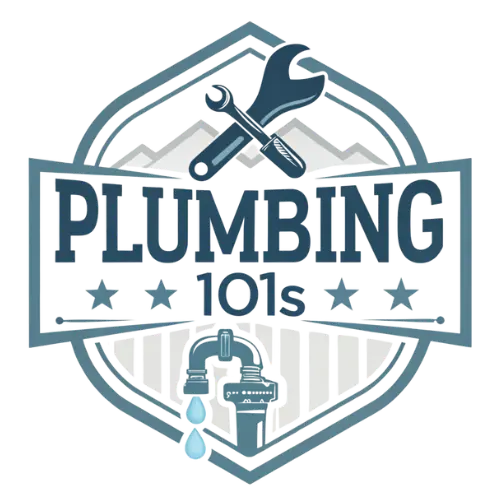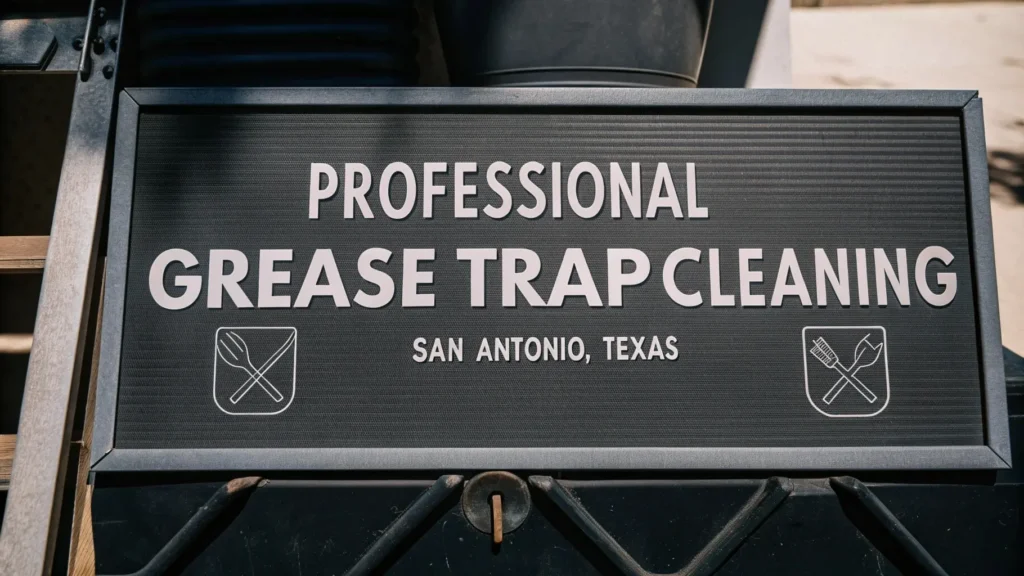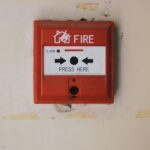Greasy buildup in your commercial kitchen’s trap system can lead to serious health code violations and expensive plumbing emergencies. As a San Antonio business owner, you need to maintain your grease trap regularly to protect your establishment and comply with local regulations.
Professional cleaning services in San Antonio ensure your system operates efficiently, preventing hazardous backup situations and foul odors that could impact your customers’ experience. Call now (773) 389-7045
By choosing expert grease trap maintenance, you’ll not only protect your investment but also extend the life of your plumbing system while maintaining a safe, compliant kitchen environment.
Grease Trap Basics
A grease trap is your first line of defense against costly sewer problems in your food service establishment. This specialized plumbing device intercepts fats, oils, and grease (FOG) before they enter the municipal sewer system, protecting both your business and the environment.
Purpose and Function
By installing and maintaining a proper grease trap, you ensure that up to 95% of FOG waste is captured and prevented from entering the sewer lines. Your grease trap works by slowing down the flow of wastewater, allowing lighter fats and oils to float while heavier solids sink, creating a clear zone of water in between that can safely flow into the sewer system.
Local Regulations in San Antonio
For San Antonio businesses, the city requires mandatory grease trap cleaning every 90 days at a minimum. Your establishment must maintain detailed cleaning records and meet specific requirements for grease trap size and installation according to the San Antonio Water System (SAWS) guidelines.
Basics of compliance include maintaining a minimum 25% rule – meaning your grease trap must be cleaned before FOG and solids accumulation exceeds 25% of the device’s capacity. You’ll need to keep cleaning records for three years and use only licensed waste haulers for disposal.
Professional Cleaning Methods
One of the most effective ways to maintain your commercial kitchen’s grease trap is through professional cleaning services. Your grease trap requires regular maintenance every 1-3 months, depending on your kitchen’s output. Professional cleaning ensures complete removal of FOG (fats, oils, and grease), preventing costly backups and compliance issues with local regulations.
Pump and Vacuum Systems
The most efficient method for grease trap cleaning involves specialized pump and vacuum equipment. Your service provider will use industrial-grade vacuum trucks capable of removing up to 3,000 gallons of waste in a single session. This system ensures thorough extraction of all accumulated waste, including solid debris and liquid grease, while minimizing disruption to your kitchen operations.
Manual Cleaning Techniques
Against common misconceptions, manual cleaning remains an important part of grease trap maintenance. Your technician will physically scrape and remove hardened grease deposits that vacuum systems might miss. This hands-on approach ensures a deeper clean and extends the life of your grease trap system.
Another aspect of manual cleaning involves detailed inspection and cleaning of individual components. Your technician will disassemble the trap’s parts, including baffles and screens, to ensure thorough cleaning. This process helps identify potential issues early and prevents emergency situations that could shut down your kitchen operations.
Maintenance Schedule
Any commercial kitchen in San Antonio requires a structured maintenance plan for grease trap cleaning to comply with local health codes. Your establishment needs to maintain detailed records of all cleaning services, ensuring your system operates at peak efficiency and prevents costly backups.
Regular Service Intervals
At a minimum, you should schedule professional grease trap cleaning every 90 days, though high-volume restaurants may require monthly service. Your specific cleaning frequency depends on your kitchen’s size and output, with most San Antonio establishments requiring service every 30-60 days to maintain optimal performance.
Emergency Cleaning Signs
Schedule immediate cleaning if you notice slow-draining sinks, unpleasant odors, or gurgling sounds from your plumbing system. These warning signs indicate your grease trap is approaching capacity and requires urgent professional attention.
It’s important to understand that ignoring these warning signs can lead to health code violations, expensive emergency repairs, and potential business closure. When your grease trap reaches 75% capacity, you need immediate professional cleaning to prevent system failure and protect your business operations.
Environmental Impact
Now, your grease trap maintenance directly impacts San Antonio’s environment and infrastructure. Improper grease disposal can contaminate local water sources and burden municipal treatment systems. Regular professional cleaning helps you comply with Texas environmental regulations while protecting the Edwards Aquifer, which supplies drinking water to over 2 million residents in the region.
Waste Disposal Protocol
Before disposing of grease trap waste, you must ensure it’s handled by licensed professionals who follow EPA-approved disposal methods. Your waste needs to be transported to authorized treatment facilities where it can be processed into biodiesel fuel or composting material, contributing to sustainable waste management practices in San Antonio.
Ecological Considerations
On a broader scale, your commitment to proper grease trap maintenance helps protect San Antonio’s diverse ecosystem. When you prevent FOG (Fats, Oils, and Grease) from entering the water system, you’re safeguarding local wildlife habitats and maintaining the natural balance of the region’s waterways.
Environmental studies show that a single gallon of improperly disposed grease can contaminate up to 25,000 gallons of water. Your responsible maintenance practices contribute to preserving San Antonio’s natural resources while helping you avoid hefty fines that can reach up to $2,000 per violation under local ordinances.
Business Benefits
Unlike neglected maintenance tasks, professional grease trap cleaning in San Antonio offers immediate and long-term advantages for your food service establishment. You’ll experience enhanced operational efficiency, reduced risk of emergency shutdowns, and improved kitchen safety. Regular maintenance helps you maintain a positive reputation while protecting your investment in kitchen equipment.
Health Code Compliance
The benefits of professional grease trap cleaning extend to meeting San Antonio’s strict health regulations. You’ll avoid potential fines of up to $2,000 per violation and maintain your establishment’s good standing with health inspectors. Regular cleaning ensures your business stays compliant with local ordinances and health department requirements.
Cost Savings
For your business operations, professional grease trap maintenance can lead to significant financial savings. You’ll prevent expensive emergency repairs, avoid costly backups, and extend the life of your plumbing system. Regular cleaning helps you maintain optimal kitchen efficiency while reducing the risk of unexpected closures.
The financial impact of proper grease trap maintenance becomes clear when you consider that emergency plumbing repairs can cost up to $5,000 or more. Your investment in regular cleaning typically pays for itself through prevented damages and maintained system efficiency. Plus, you’ll avoid the lost revenue from unexpected closures that can severely impact your bottom line.
Choosing a Service Provider
Once again, selecting the right grease trap cleaning service in San Antonio requires careful consideration. You’ll need to evaluate providers based on their credentials, track record, and service quality. Your choice will directly impact your establishment’s compliance and operational efficiency. The right provider ensures your system operates at peak performance.
Licensing Requirements
Behind every legitimate grease trap service provider in San Antonio stands proper licensing and certification. You must verify that your chosen company holds valid permits from the Texas Commission on Environmental Quality (TCEQ) and local authorities. The compliance with these requirements protects your business from potential legal issues.
Experience Factors
Besides technical qualifications, experience plays a vital role in service quality. Consider these imperative factors:
- Years in business serving San Antonio
- Emergency response capabilities
- Equipment quality and maintenance procedures
- Customer testimonials and reviews
The expertise of your provider directly influences your system’s longevity.
Service providers’ experience manifests in their approach to:
- Customized cleaning schedules based on your needs
- Professional inspection protocols
- Waste disposal methods
- Documentation and reporting systems
The right combination of these factors ensures optimal performance of your grease trap system.
Conclusion
Hence, your commitment to regular grease trap cleaning in San Antonio, Texas, will protect your business and the environment. By partnering with professional cleaning services, you ensure your establishment meets local regulations while preventing costly backups and unpleasant odors.
Your proactive approach to maintenance not only extends the life of your grease trap system but also contributes to the city’s infrastructure health. When you prioritize proper grease trap care, you invest in your business’s long-term success and demonstrate responsible environmental stewardship.
FAQ
Q: How often should I have my grease trap cleaned in San Antonio, Texas?
A: In San Antonio, commercial kitchens should have their grease traps cleaned every 1-3 months, depending on the size of the establishment and the volume of food prepared. Restaurants with high-volume cooking operations may need monthly cleaning, while smaller establishments might maintain quarterly schedules. Regular cleaning helps comply with San Antonio’s local health codes and prevents costly backups.
Q: What happens if I skip professional grease trap cleaning services?
A: Neglecting grease trap maintenance can lead to several serious issues: foul odors in your kitchen, slow-draining sinks, potential health code violations resulting in fines, expensive emergency plumbing repairs, and possible business closure by health inspectors. Additionally, untreated grease buildup can damage San Antonio’s municipal sewer system, leading to additional penalties from the city.
Q: What should I expect during a professional grease trap cleaning service in San Antonio?
A: During a professional cleaning, technicians will first inspect your system, then remove the trap cover and measure grease levels. They’ll use specialized equipment to vacuum out all waste, grease, and water. The entire trap will be thoroughly cleaned, including walls and baffles. Technicians will also provide documentation for health department records and inspect for any potential issues requiring attention. The process typically takes 1-2 hours, depending on trap size and condition.



